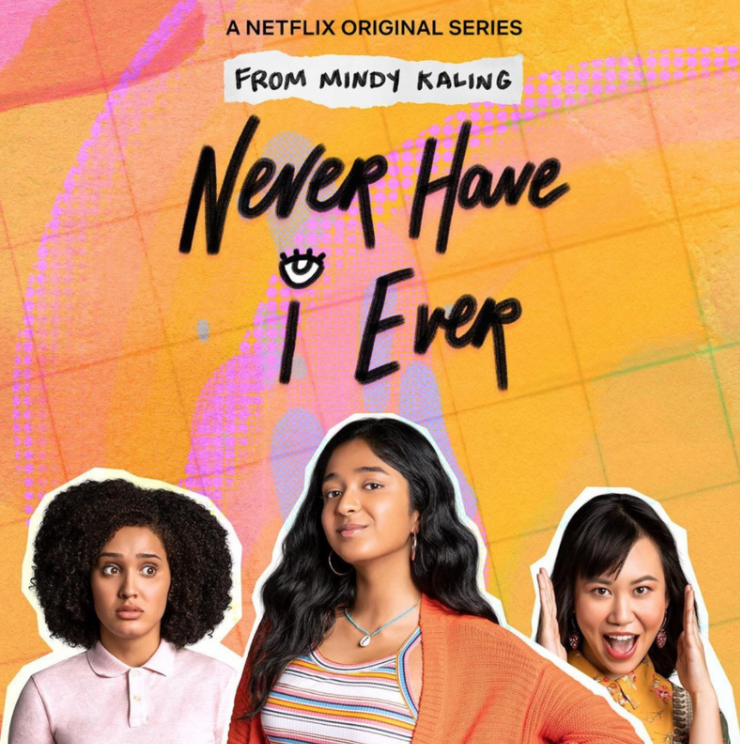A poignant story that masterfully blends comedy with emotional reality, Netflix’s new series Never Have I Ever well-encapsulates the Indian American experience.
Never Have I Ever showcases the often overlooked viewpoint of growing up in a culture so different from one that immigrant children experience at home, and the resulting inner turmoils that can manifest as a result of this divide.
The latest project by Mindy Kaling and Lang Fisher, the show follows Devi Vishwakumar, an ambitious and not-so-subtly depressed Indian American high school sophomore looking to reinvent herself after the tragic death of her father and her subsequent paralysis. Coming back to school the following fall , Devi’s main goals are to get a boyfriend, work towards her college application as one of the top students in her grade, and skate through living with her strict mother and seemingly perfect older cousin.
As one of the only pieces of popular western media that depicts South Indian representation – from the celebration of Ganesh Puja to the Tamil-speaking household Devi grew up in, to the shrine of gods set up for prayer that is a staple in every Hindu household – in a mainstream light, this show fills a role for a subsect of Indian representation that was more woefully neglected prior to its creation.
As a South Indian young adult, the Indian representation that I saw in American cinema and television prior to this was heavily influenced by more North Indian customs and religions. While large components of the Indian population do speak Hindi, watch Bollywood movies, and eat meat, seeing this more specific representation of my own family’s customs and habits was the depiction I didn’t know I craved until I had it.
Though primarily a comedy, the show does an excellent job of showcasing central struggles and issues that permeate my own experience. The conflict between Devi and her mother – of her trying to reconcile her own feelings of always disappointing her mom with the fact that her father, the buffer in their frequent arguments, is no longer with them – hits close to home for many mothers and daughters I know who are a part of the same demographic that this show is aimed towards. We see touching flashbacks of young Devi and her father watching sports and planting gardens together that is generally reminiscent of happier times, contrasted with the current divisiveness in her home life.
This same home life also portrays additional pieces of Indian culture through Devi’s cousin Kamala’s own arranged marriage subplot, and about how, contrary to popular depiction, the decision to go through with one is not inherently demoralizing or abusive on part of the family. It showcases how high academic and collegiate aspirations can be something that Indian children desire for themselves, and not solely because of the stereotypical parental pressure.
One of Never Have I Ever’s shining components is the acknowledgement of the cultural dissonance that many young adults face growing up in a culture so separate from that of their parents.
While at times Devi’s own rejection of her Indian heritage can get to be overly self-deprecating, that feeling of not “being Indian enough” through her hobbies and actions (i.e, not learning traditional dances, how to cook regional foods, etc.) resonated with me and my struggles of reconciliation. We see some of Devi’s other Indian peers talking about how they too felt disconnected from their culture until they learned to appreciate it more in college, and about how participating in Indian functions and customs is not anything to be ashamed of, although it may feel this way when we are very young. Even Kamala, who was born and raised back in India and therefore herself feels more of a connection to the culture compared to Devi, struggles to reconcile her perceived duty to be a good future traditional wife with her current project of undertaking a PhD at Caltech.
Despite all this show does for South Asian representation, it is not perfect. It’s not for those who are particularly sensitive to some waves of secondhand embarrassment, and some South Asian references, like the infamous shot of Devi’s dream sequence where she is told she has “the beauty of Priyanka Chopra” – feels contrived and forced at times. Devi herself is prone to anger and can be downright unlikeable in her worst moments – yet this in and of itself makes the show more of an adequate representation for many South Indian girls. Her character is not meant to be an all-inclusive portrayal of what it is like to grow up South Indian; rather, it focuses on some of the commonalities of the experience, and hones in on their consequent intricacies masterfully.
All in all, Never Have I Ever is a funny, sweet, and relatable show suited for a wide audience. Maitreyi Ramakrishnan, the lead actress whose first acting credit is with this show, has excellent comedic timing and portrays an overall sympathetic character. Back-to-back scenes make the audience laugh one moment and cry the next, and every side character is given a subplot and background that gives them depth and ensures that no one person or episode feels like a filler. Many watchers even outside of the show’s core demographic of South Asian women would enjoy adding it to their Netflix watchlist.

Comments are closed.